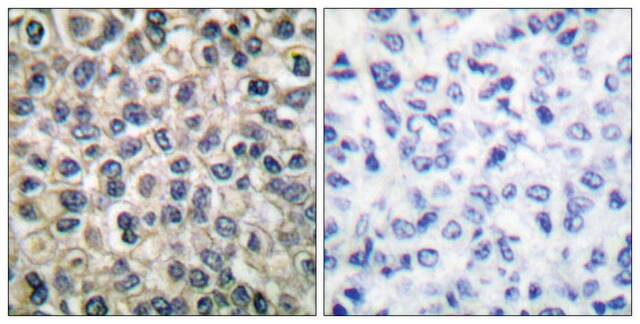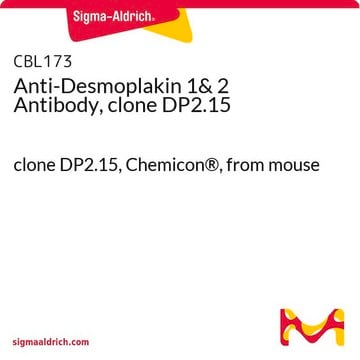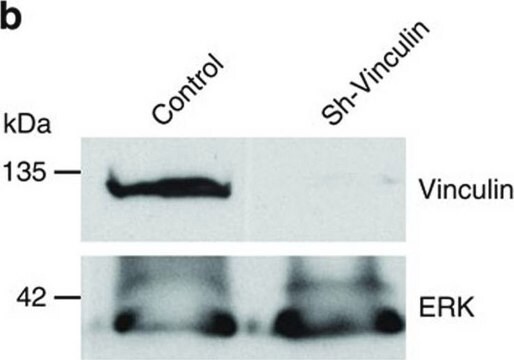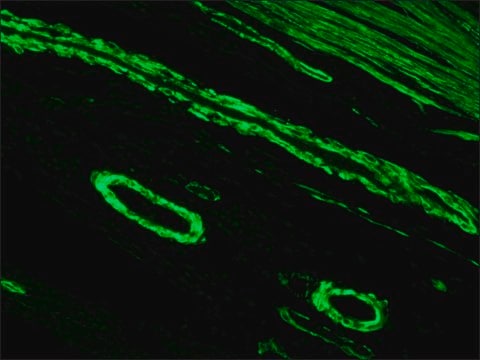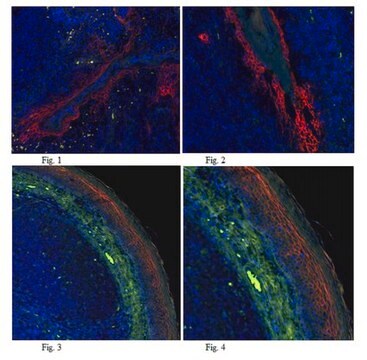推荐产品
生物源
mouse
品質等級
共軛
unconjugated
抗體表格
ascites fluid
抗體產品種類
primary antibodies
無性繁殖
15F11, monoclonal
形狀
buffered aqueous solution
分子量
antigen 85 kDa
包含
15 mM sodium azide
物種活性
bovine, canine, human
技術
immunocytochemistry: suitable using cultured cells
immunohistochemistry (frozen sections): suitable
immunoprecipitation (IP): suitable
indirect immunofluorescence: 1:1,000 using cultured MDBK cells
microarray: suitable
western blot: 1:2,000 using cultured MDBK cells
同型
IgG1
UniProt登錄號
運輸包裝
dry ice
儲存溫度
−20°C
目標翻譯後修改
unmodified
基因資訊
human ... JUP(3728)
一般說明
Plakoglobin is a desmosomal protein that regulates developmental signalling in vertebrates. Tyrosine phosphorylation of plakoglobin has been linked to adenocarcinomas . Plakoglobin may function as a tumor suppressor in ovarian and breast cancers .
特異性
The antibody recognizes the plakoglobin (catenin-γ) molecule (85 kDa and possibly a slightly lower band) by immunoblotting. It does not cross-react with β-catenin. The antibody reacts with plakoglobin in bovines, humans and dogs, but does not react with β catenin.
免疫原
recombinant chicken plakoglobin.
應用
Monoclonal anti-plakoglobin (catenin γ) antibody is suitable for use in immunocytochemistry (using MDCK cells), immunoprecipitation, and in immunoblotting . The antibody may also be used for immunohistochemistry (frozen sections), microarray, western blot (1:500, using cultured MDBK cells) and indirect immunofluorescence (1:1000, using cultured MDBK cells).
免責聲明
Unless otherwise stated in our catalog or other company documentation accompanying the product(s), our products are intended for research use only and are not to be used for any other purpose, which includes but is not limited to, unauthorized commercial uses, in vitro diagnostic uses, ex vivo or in vivo therapeutic uses or any type of consumption or application to humans or animals.
Not finding the right product?
Try our 产品选型工具.
儲存類別代碼
10 - Combustible liquids
水污染物質分類(WGK)
nwg
閃點(°F)
Not applicable
閃點(°C)
Not applicable
S Shibamoto et al.
Cell adhesion and communication, 1(4), 295-305 (1994-01-01)
The effect of hepatocyte growth factor/scatter factor (HGF/SF) and epidermal growth factor (EGF) on cadherin-mediated adhesion of human carcinoma cells was studied. HGF/SF induced scattering of colonic adenocarcinoma HT29 and gastric adenocarcinomas MKN7 and MKN74 cells. Likewise, EGF induced scattering
Rene L Begay et al.
JACC. Clinical electrophysiology, 4(4), 504-514 (2018-08-02)
The purpose of this study was to assess the phenotype of Filamin C (FLNC) truncating variants in dilated cardiomyopathy (DCM) and understand the mechanism leading to an arrhythmogenic phenotype. Mutations in FLNC are known to lead to skeletal myopathies, which
Iris Wu et al.
Communications medicine, 4(1), 38-38 (2024-03-19)
Arrhythmogenic right ventricular cardiomyopathy (ARVC) is a familial cardiac disease associated with ventricular arrhythmias and an increased risk of sudden cardiac death. Currently, there are no approved treatments that address the underlying genetic cause of this disease, representing a significant
Zhilun Li et al.
Molecular biology of the cell, 21(19), 3317-3329 (2010-08-20)
Cell-to-extracellular matrix adhesion is regulated by a multitude of pathways initiated distally to the core cell-matrix adhesion machinery, such as via growth factor signaling. In contrast to these extrinsically sourced pathways, we now identify a regulatory pathway that is intrinsic
H Aberle et al.
Proceedings of the National Academy of Sciences of the United States of America, 92(14), 6384-6388 (1995-07-03)
The gene encoding human plakoglobin was mapped to chromosome 17q12-q22. An intragenic restriction fragment length polymorphism was used to localize the plakoglobin gene distal to locus KRT10 and proximal to the marker D17S858. The plakoglobin gene colocalizes with the polymorphic
我们的科学家团队拥有各种研究领域经验,包括生命科学、材料科学、化学合成、色谱、分析及许多其他领域.
联系技术服务部门
